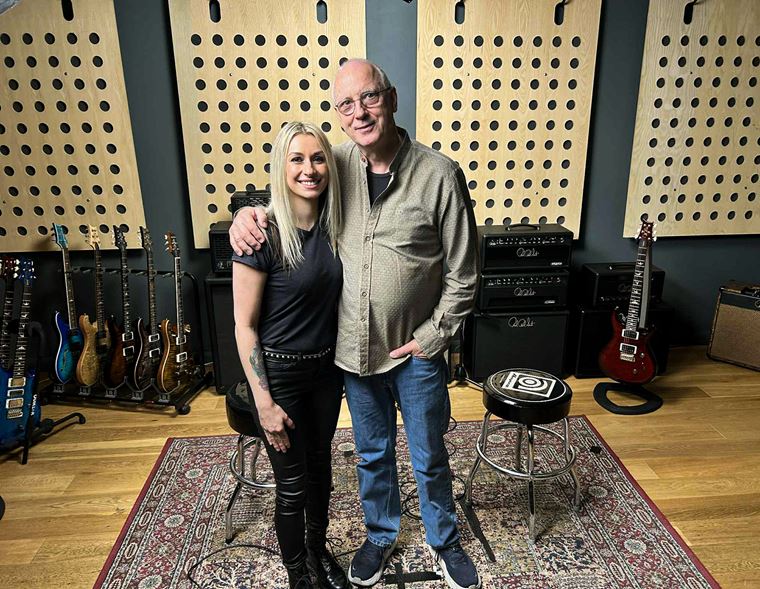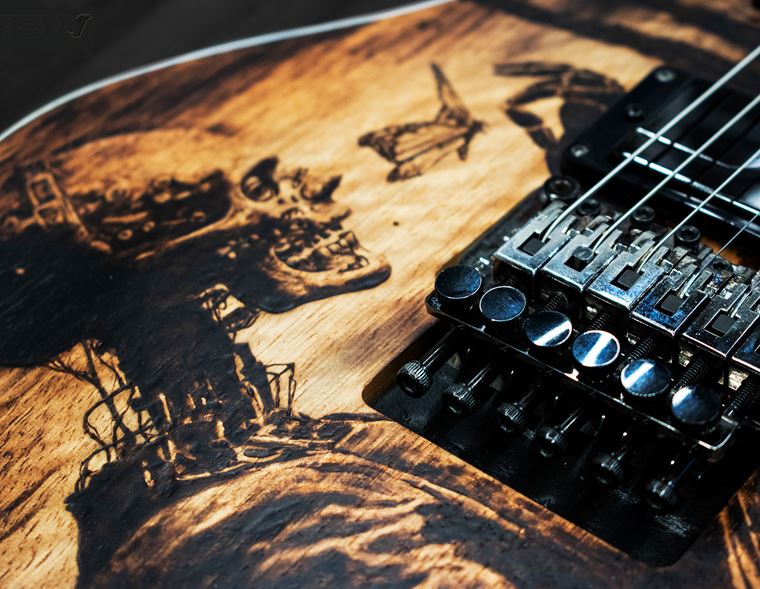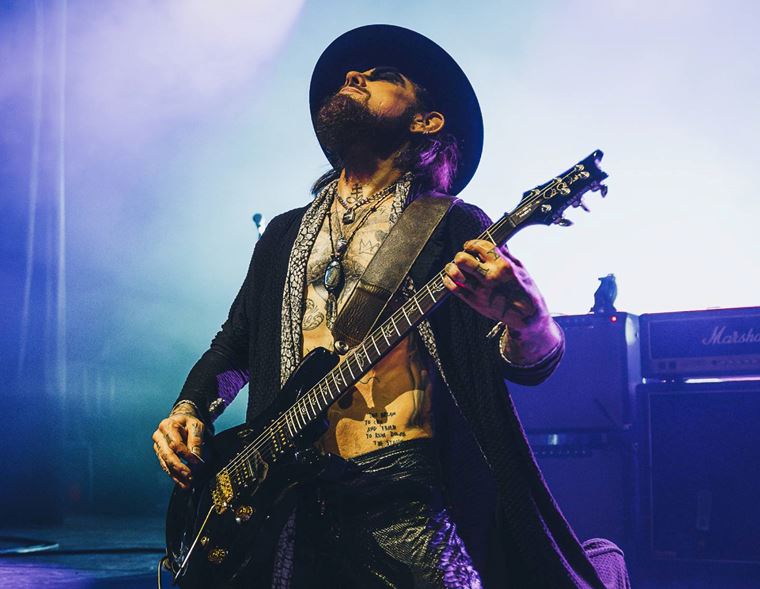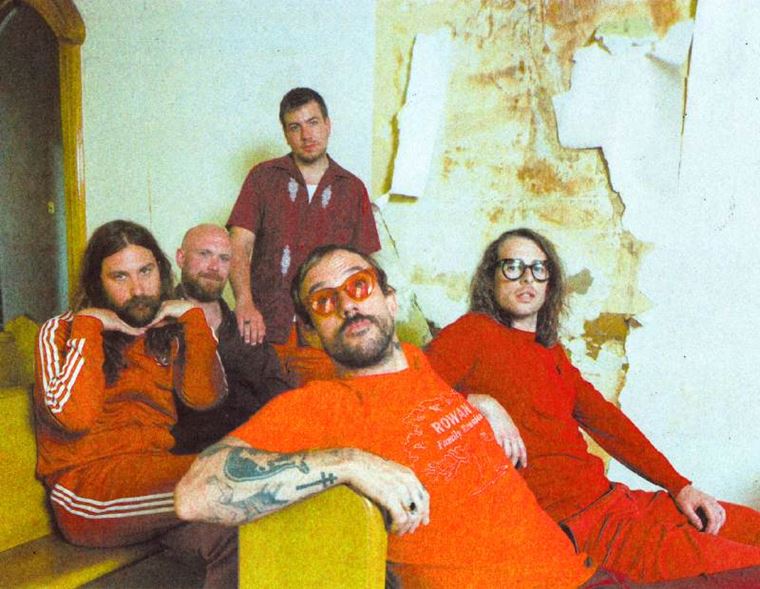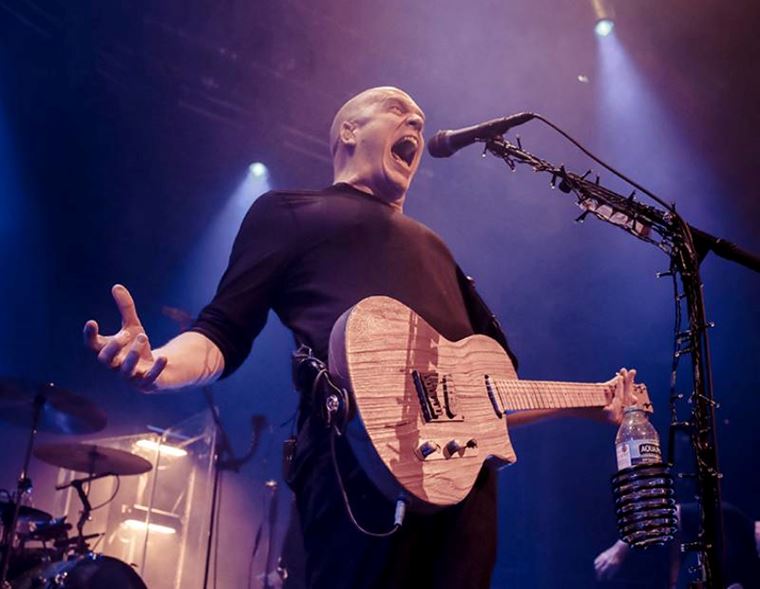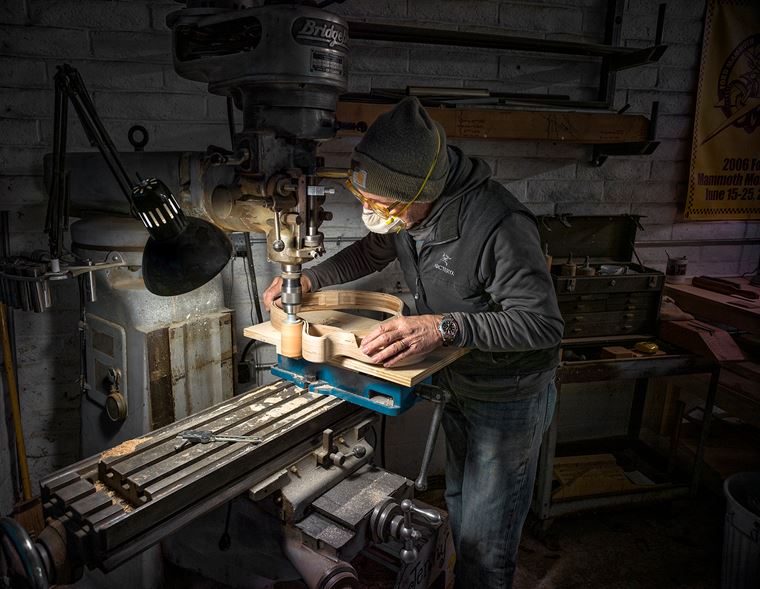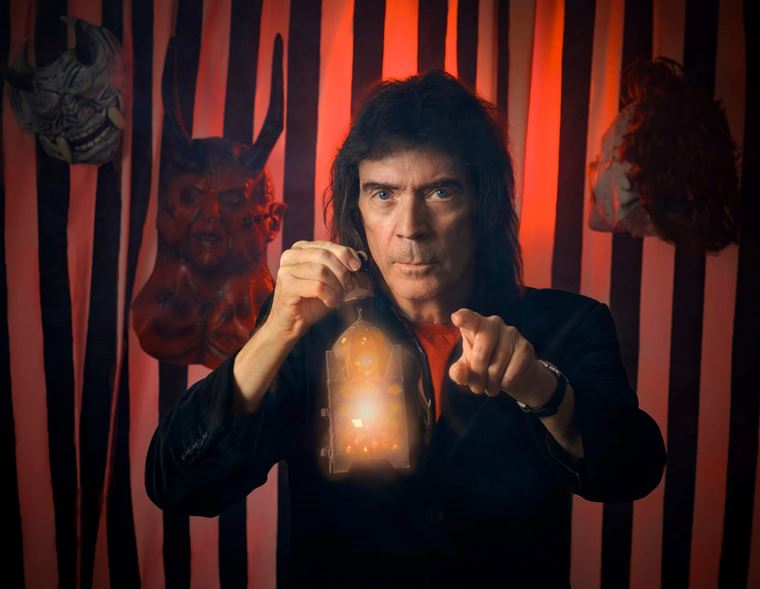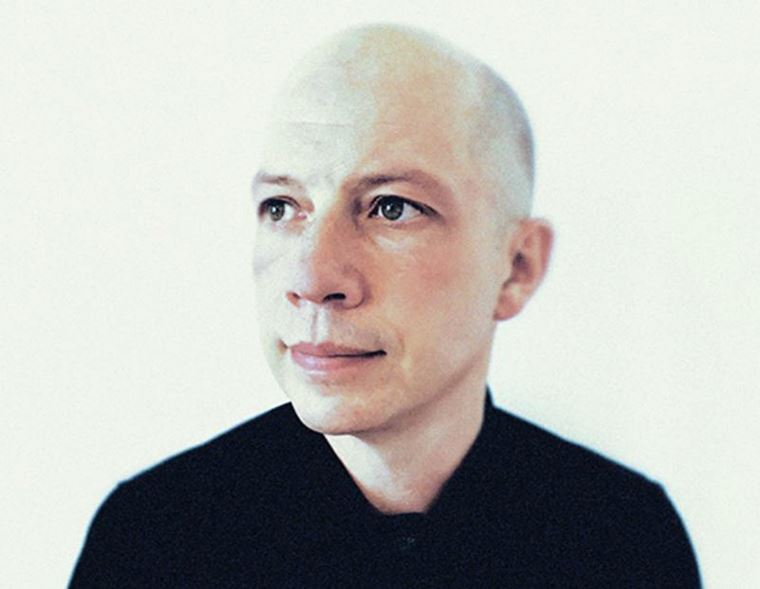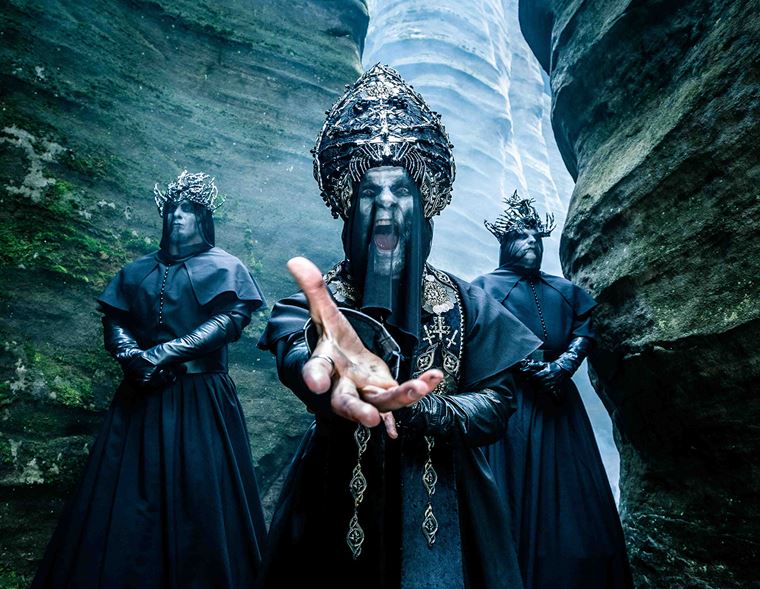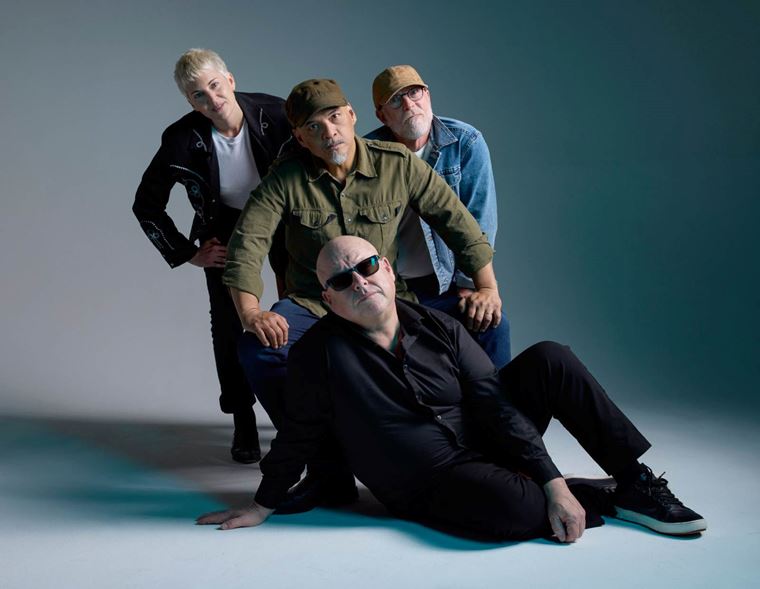"Back in the Doors days, I would break the neck off a Champagne bottle for a slide: they had the best sound!" ROBBY KRIEGER talks EXCLUSIVELY to guitarguitar!
When somebody asks you if you want to spend half an hour talking guitars with Robby Krieger of The Doors, you say yes!
I’ve been a big Doors fan since I was a teenager, thanks to my older brother pushing their debut album on me (and that intro scene from Apocalypse Now, of course). Ever since, of all the 1960s rock bands, The Doors have had a special gravitational pull towards their universe. It’s such an original and unusual sound - a mix between Krieger’s haunted slide, Ray Manzarek’s otherworldly keyboards, John Densmore’s expressive, painterly drums and of course Jim Morrison’s iconic, era-defining baritone.
It’s all of that plus the shamanic vibe, the theatrical performances, the poetry, the danger and the mythology of Morrison’s life: a heady brew that continues to intoxicate even after all of the passing decades.
Suffice to say that I was more than eager to have a conversation with Kreiger. As the member who wrote most of band’s biggest hits (Light My Fire, Touch Me, Love Her Madly and Love Me Two Times were all his songs), his influence over modern music is larger than his humble attitude would imply. He’s rock royalty, basically, and with his new band Robby Krieger and the Soul Savages, he’s created a new body of work that distils plenty of the charm and melody we’d expect from him, along with grooves and colourful moods that have ‘Los Angeles’ written all over every track. It’s a rewarding listen indeed, and I was more than happy to discuss it.
As you might expect, Krieger has fielded more than his fair share of repetitive Doors-related questions over the years, and so I was politely briefed ahead of time to keep the focus on the new record. As it turned out, we managed a little of both in our half-hour Zoom call, which found Robby in a friendly and relaxed mood.
As one of the most distinctive slide players in the world, I wanted to focus on that, and Robby was happy to oblige! A man of relatively few words, he still imparted plenty of info and wisdom. Scroll down to read the entire interview!

(Photo: Jill Jarrett)
Contents
Talking Slide with Robby Krieger
Robby Krieger Interview
Guitarguitar: So, Robby, The new record is brilliant sounding, I’ve been playing it a lot! I'd love to begin chatting about maybe the writing process? When you were working with Kevin, did you guys have an overall mood or concept that you had in mind when you were writing songs?
Robby Krieger: Well, not really. We would just start jamming basically, and see what happens, you know? A lot of the time, Kevin and Franklin the drummer would start playing something, and then Ed and I would join in and it just… the songs just kinda came together by accident, you know? (laughs) There was nothing really planned out about it, you know, it was mostly from jamming.
GG: Oh cool! And it was all recorded in the studio that you own. Were you guys just kind of coming in and out when you felt like it?
RK: Yeah, yeah pretty much! I have a studio in Glendale and a couple of the guys live right near there, so that made it pretty easy.
GG: Yeah, and they're all quite storied musicians, like Grammy winners and so on. How did you go about choosing the people that you wanted?
RK: Well, you know, I had known Kevin quite a while, maybe 15, 20 years. He'd been on one of my other solo albums. And then he got sick. He got really sick about three years ago. And I thought he was going to be gone, man. And I got sick too, I had melanoma that got in my lung. Luckily we both made it through.
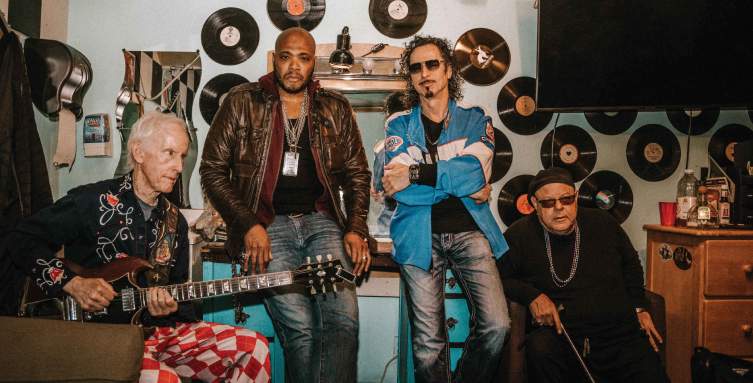
So we got back together and, ‘hey, let's get together!’ Then Ed Roth, the keyboard player, he lives right near my studio and he's played with Annie Lennox and all these people. So he came by. And then let's see who… Franklin was a friend of Kevin and that's how he got into it. It really was kind of an accident, you know, but a good one (laughs)
GG: Absolutely! One of the things that I really enjoyed listening to, I mean, there's so much there for your ears to take in, but part of it is the interplay between the guitar and the keyboard instruments. Of course, that's something you're known for previously! I was thinking, can a lead guitarist learn a lot by being in a band with another lead instrument that isn't a guitar?
RK: Oh yeah, I think so for sure. You know, Ed is a really great musician. He's not a schooled guy, you know, and neither am I. That made it good for us, to just jam off of each other. And it was just really fun to be able to play off of a keyboard, like Ray and I used to do.
GG: Yeah, with timing, quite often what I always appreciated your playing - and I mean, I've been a fan of your guitar playing for decades, and I think you're one of the greats - is how often you have ‘moment’s, but you're also really good at staying back, allowing other things to percolate and other things to happen. So there's like a language developing. Is that something that you kind of were obliged to do because of this idea of there being another lead instrument?
RK: I think I learned that from, you know, playing with Ray. Ray was older than us. He was like… I was maybe 19 and he was 27 and so he was kind of the leader - at first - of the band. I would just play off of him. That's kind of how I learned. I've always played with keyboard players, even after Ray. It just makes sense to me, you know what I mean?
Talking Slide with Robby Krieger
GG: Yeah, I do. Absolutely. I'd love to talk about your slide playing. In my early years as a guitarist, one of my favourite things to hear was the way it was melodic, but very unusual because you can coax so many things from a slide. Can I talk to you about your slide technique and stuff?
RK: Yeah!
GG: Excellent! So, what is your favourite kind of weight of slide and material, and what finger do you use?
RK: I use my little finger on the left hand and I like metal slides. You know, I used to use wine bottles back in the Doors days. I would break the neck off of a Champagne bottle actually! (laughs) They had the best sound! But when the metal ones came out, I switched over to those: I think they really sound better. And I like the big one, you know, even though my fingers are not very big: I like to have room in there, you know? So, I like a large diameter slide.
GG: Yeah, and I wonder, because obviously on the records you can play your slide parts separately from anything else you need to do, but in performance, quite often you're using the same instrument to do both. Did you have to have a particular setup? Like, really high action, or the strings need to be heavy to incorporate all that?
RK: Yeah, it helps to have a high action, you know, for a slide. Otherwise, you're going to bottom out. I mean, I can do it if I have to on a regular action guitar. But I do have a different SG guitar that I use for a slide when we play.
"I just always have loved that guitar. I think that when I first got it, I took acid one day and then I looked at my guitar and I said: 'Wow, that looks like the devil, man!'"
GG: Yeah. And I'm wondering about muting, because it was like playing so clean, you know how often there's loads of noise, loads of extra artefacts that happen when you use the slide. You've got very, very clean control with your notes and pitch. So are you using both hands? Like, does your left hand do anything with your other fingers to sort of like mute the notes?
RK: No, no, I don't do anything with the other fingers. I just concentrate on keeping it clean and not pressing too hard. But you have to press hard enough! (laughs) It's like: you have to be right in the middle.
GG: Yeah, there is a sweet spot, isn't there? Otherwise, it will just ping off the string, or otherwise it will hit the fret and you will lose it.
RK: Right, exactly.
GG: Okay. And presumably you are using standard tuning mostly or do you use alternative tunings?
RK: It's mostly standard. There are a couple of... Yeah, really, I think I played everything standard on this record. The only weird thing was that on that Samosa song I used an electric sitar. And that has those sympathetic strings which you have to tune, which is not easy, believe me. (laughs)
GG: Yeah, I know this song, that's the second song on the record, right?
RK: Yeah, one of my favourites.
GG: Oh, it's great. Yeah. With the notes when you're playing slide, the notes are always very accurate. Because the guitar is fretted, and your slide is hovering above the frets on the strings, are you just sort of aiming for the pitch, or are you feeling for it when it comes up close? How do you get so accurate?
RK: It's some of both. I think you can look and see where you are to get the right area, but then you've got to just feel it to get the exact right note, because it's such a tiny area: it’s so easy to miss. You have to really use your ears a lot when you're playing slide.
GG: Yeah. One of the other things I was thinking about was your approach to constructing parts. When you're writing your music, do you think that being a slide player - because you're kind of like linear going up and down, due to the nature of how it is, playing slide - does that make you inherently more of a melodic player than when you can go across the strings and do like scales and stuff?
RK: Oh, I never thought of that! Yeah, I suppose. Yeah, you're right. I mean, there's something to be said about going up and down rather than across, and you know in reality, that's really the difference between playing slide and not. Yeah you're thinking more up and down.
GG: Yeah, it isn't like you've got your bag of tricks, where you can do like all kinds of licks: when it's a slide, you're gonna be more deliberate, like ‘no, I actually want to go from the E to the G sharp’ or whatever.
RK: Yeah, but then again you're using the top three strings quite a bit. I use all the strings when I play slide so you know you can stay in one area if you want and just use the different strings to change how high and low it goes. I like to do that as much as I can, you know? But you have to go up and down too! That's the fun of slide! (laughs)
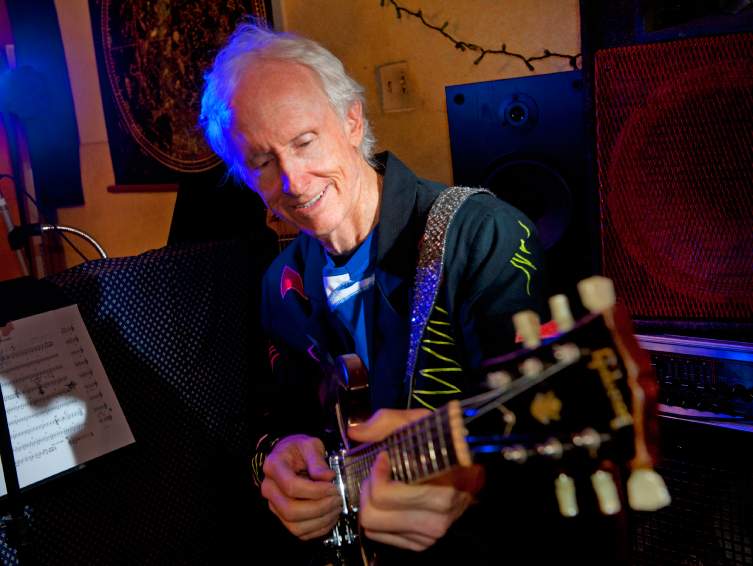
(Photo: Jill Jarrett)
GG: Haha, yeah, exactly! In terms of your right hand, because I know that you had some classical training and you had some flamenco lessons and so on, So when it comes to playing melodies or solos, is it your thumb that is your main ‘instrument’ and then the other fingers are supportive?
RK: You mean on slide or just regular?
GG: Just regular, yeah, just regular.
RK: Yeah, I tend to use the thumb and the first two fingers, mostly. You know, I do a little bit of flamenco still, you know, Spanish Caravan, when I do that. I use all three fingers, but it's mostly the thumb and the first two fingers.
And you know, I've gotten to where I'm using a pick a lot more lately, too. So, I don't just use my fingers anymore, you know? I read this article by Wes Montgomery one day and he said - you know because he never used a pick - so they said “Hey, if you had to do it all over again, would you learn to use a pick?” He said “Yeah! Hell yeah!” Have you ever seen his thumb?
"Gibson are trying to put out a new one of my '67 SG but they can't get the damn parts for it!"
GG: I don’t think I have, no!
RK: Oh? My god, his thumb is just like a piece of meat! It's so beat up because he uses it like a pick, you know? So I said, okay, I'm gonna learn to use that. That was back in the 70s and if you listen to something like… do you know about the Butts band?
GG: Yes, I do (The Butts Band were a mid-70s group created by Krieger and Doors drummer John Densmore, along with a changing cast of other members)
RK: The Butts band stuff was with a pick. And still today, I still use my fingers quite a bit but I use a pick. It’s probably half and half.
GG: Interesting! I wondered about that, because of course I always just assume that you're playing with your fingers because you're famous for it. I'm not going to talk too much about The Doors, but on tunes like Ghost Song when you play the solo, that always sounded like a pick to me. Was it?
RK: Yeah, yeah that was definitely a pick.
GG: Right! And so do you have a preference for a type?
RK: I like a medium gauge, kind of plastic, you know? Not too heavy.
Robby’s Gibsons
GG: Not too heavy. I didn't realise that, that's interesting. Okay, let's talk guitars then! Obviously I associate you with the Gibson SGs, but what are you playing these days?
RK: I’m still playing the SGs! It’s my favourite, but you know, my original SG was actually a Melody Maker. That’s the one I played on the first two Doors albums, a Melody Maker which is like a cheap version of a Les Paul Jr. It had those black pickups, you know?
That got stolen and then I bought an SG, which has the humbuckers. I’ve pretty much stuck with that ever since. That one got stolen too. So about 20, 30 years ago, I found this 67 SG, which is the one I'm using today.
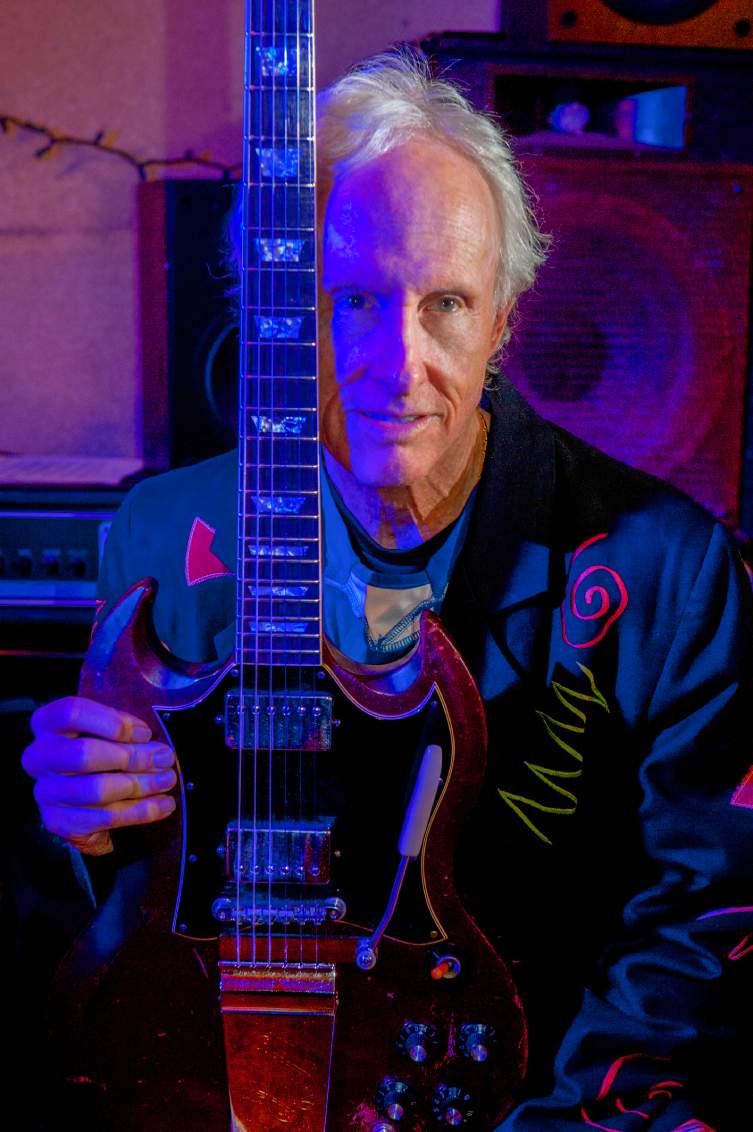
(Photo: Jill Jarrett)
GG: Oh wow, nice.
RK: Yeah, it's really a good one. I've had Gibson make a couple of models off of that one. It's a really, really nice guitar.
GG: I also remember, it's probably going back around ten years now, but I used to work on the guitar shop sales floor and there was a wonderful Gibson Custom Shop Robby Krieger Les Paul Custom, a limited edition one. I might be getting this wrong, but did you use the Les Paul Custom often in the studio?
RK: Not that much. I used it mostly for slide back in The Doors, but yeah, I did have that black Les Paul thing that came up about 10 years ago. You're right. They're trying to put out a new one from my 67, where I've actually painted the part that goes down from the bridge, down to the bottom of the guitar. So I painted about 30 or 40 of different ones and they can't get the damn parts for it!
GG: Wow, that's crazy. It’s like: you’re with Gibson, how hard is it gonna be for Gibson to make a Gibson, right?
RK: I mean, Gibson is, I don't know what's going on with them, but they're not even at the NAMM show this year.
GG: Yeah, I noticed that. I really don't know. See, from our side of things, they are making a lot of strange decisions, but we still love them, don’t we?
RK: Haha, yeah! Yeah. And you know, I used a 355 quite a bit back in the 80s and 90s. So I've got a couple of those 335s, 355s. I traded Alex Lifeson one of my guitars for one of his 335s.
GG: Nice. So is the SG just kind of like the best of all worlds for you?
RK: Yeah, I like the weight of it for one thing and the sound. And, you know, it doesn't feed back as much as 335s.
GG: Yeah. Yeah, big bonus!
RK: I just always have loved that guitar. I think that when I first got it, I took acid one day and then I looked at my guitar and I said: wow, that looks like the devil, man! (laughs) Has those horns on it, you know?
GG: That's an appropriate response to it, yeah! You get loads of beautiful tones on this new Soul Savages record. What are you plugging into, amplifier wise?
RK: Mostly it was the Fender, what do you call the 410 one, the Hot Rod DeVille.
GG: Okay. And how about overdrive, is there anything like that?
RK: Well, it has overdrive built into it, but I also have a couple of those green pedals, you know, what are those called?
GG: The Ibanez Tube Screamer?
RK: Yeah, Tube Screamers. And then I have this little, what do you call it? It's like a, it's got a whole bunch of sounds in it. I can't remember the name of the damn thing. But I use that thing when I overdub at home. It's got hundreds of sounds in it, you know. It’s a BOSS, and it has chorus and other stuff.
Touring and Legacy
GG: Got you, yeah. So, do you reckon there might be any opportunities for the Soul Savages to do any live shows or touring or anything?
RK: Yeah, I hope so. We've been actually playing around LA for the last two years. We love to play live, so I'm hoping that this record will open up some opportunities for that.
GG: Oh brilliant! I hope you make it over here.
RK:Yeah, that would be nice.
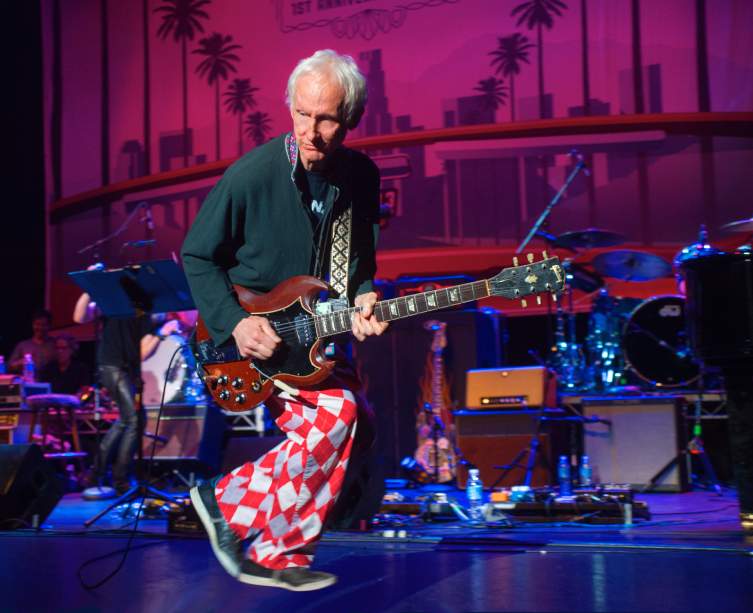
(Photo: Jill Jarrett)
GG: It's got two more questions for you, Robby, I hope that's okay? One of them is a Doors question, one of them isn't. Is that cool?
RK: Yeah.
GG: Thank you. And it's more about the lasting legacy because to me, The Doors obviously are a highly influential and hugely popular band. They’re also quite an unusual sounding band compared to lots of the kind of more standard rock n roll, Rolling Stones type of sound. So despite being so massive, not many people since have really tried to copy The Doors’ sound. Why do you think that is?
RK: It's a good question. I mean, there's been a couple, you know? Echo & The Bunnymen and stuff like that, but yeah, I don't know. I think… I think it's just so different sounding than anybody else that I think that if they did try to copy that, people would know it right away.
GG: Yeah, it might well be that. It’s strange though: there are so many directions that the music took, you think that people would take some of that sound but it still seems to be quite tightly its own thing and that's a beautiful thing.
RK: Well Billie Eilish just did a couple songs that were very Doors-ish. if you notice? Yeah, one of them sounds just like People are Strange, and then another one sounds like Five to One. (laughs)
GG: Ah, ok! I didn’t notice that! I’ll need to go back and listen closer. So the last one. This is one of those, classic ‘final questions’. Being that you've made music that has lasted for so long and has remained fresh for so long, and has been so historically significant, I ask you, as a guitar player, from one guitar player to another: what is the one most important thing you've learned as a guitarist in all of your experience?
RK: Jeez! (laughs) The one most important thing. Well, it's probably to not sound like anybody else. You know, if your mother can't listen to the radio and when your song comes on, if she doesn't recognize you, then you know you've failed. (laughs)
GG: Excellent, that's a great answer, Robby!
It’s amazing how quickly half an hour flies by when you’re chatting guitars with a bona fide legend. As I mentioned before, I was understandably asked not to start firing off dumb Jim Morrison questions, and I’m happy to say that we didn’t do that, but we did get some Doors-related discussion in there! As a musical force, Robbie is still strong, and this new record will be a delight when summer comes, for sure. It’s out now, so you have plenty of time to get acquainted with its charms before the LA weather (haha) arrives.
I’d like to thank Robbie for fitting me into his schedule, and to Lee for making the connection.
Keep up with all of Robbie’s activity on the official Robby Krieger website, and maybe also keep an eye out over here for any updates on that Gibson reissue SG!
In the meantime, thanks for reading, and find over 150 more unique interviews like this one at the guitarguitar Interviews page.


